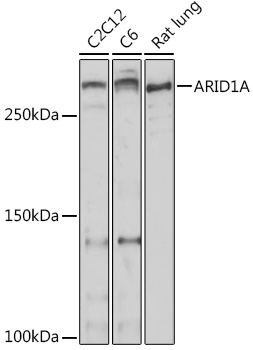Cell Biology Antibodies 15
Anti-ARID1A Antibody (CAB18650)
- SKU:
- CAB18650
- Product Type:
- Antibody
- Reactivity:
- Human
- Reactivity:
- Mouse
- Reactivity:
- Rat
- Host Species:
- Rabbit
- Isotype:
- IgG
- Research Area:
- Cell Biology
Description
| Antibody Name: | Anti-ARID1A Antibody |
| Antibody SKU: | CAB18650 |
| Antibody Size: | 20uL, 50uL, 100uL |
| Application: | WB |
| Reactivity: | Human, Mouse, Rat |
| Host Species: | Rabbit |
| Immunogen: | Recombinant protein of human ARID1A. |
| Application: | WB |
| Recommended Dilution: | WB 1:500 - 1:2000 |
| Reactivity: | Human, Mouse, Rat |
| Positive Samples: | C2C12, C6, Rat lung |
| Immunogen: | Recombinant protein of human ARID1A. |
| Purification Method: | Affinity purification |
| Storage Buffer: | Store at -20°C. Avoid freeze / thaw cycles. Buffer: PBS with 0.02% sodium azide, 50% glycerol, pH7.3. |
| Isotype: | IgG |
| Sequence: | Email for sequence |
| Gene ID: | 8289 |
| Uniprot: | O14497 |
| Cellular Location: | |
| Calculated MW: | |
| Observed MW: | 270kDa |
| Synonyms: | |
| Background: |
| UniProt Protein Function: | ARID1A: Involved in transcriptional activation and repression of select genes by chromatin remodeling (alteration of DNA-nucleosome topology). Binds DNA non-specifically. Also involved in vitamin D- coupled transcription regulation via its association with the WINAC complex, a chromatin-remodeling complex recruited by vitamin D receptor (VDR), which is required for the ligand-bound VDR- mediated transrepression of the CYP27B1 gene. Belongs to the neural progenitors-specific chromatin remodeling complex (npBAF complex) and the neuron-specific chromatin remodeling complex (nBAF complex). During neural development a switch from a stem/progenitor to a post-mitotic chromatin remodeling mechanism occurs as neurons exit the cell cycle and become committed to their adult state. The transition from proliferating neural stem/progenitor cells to post-mitotic neurons requires a switch in subunit composition of the npBAF and nBAF complexes. As neural progenitors exit mitosis and differentiate into neurons, npBAF complexes which contain ACTL6A/BAF53A and PHF10/BAF45A, are exchanged for homologous alternative ACTL6B/BAF53B and DPF1/BAF45B or DPF3/BAF45C subunits in neuron-specific complexes (nBAF). The npBAF complex is essential for the self-renewal/proliferative capacity of the multipotent neural stem cells. The nBAF complex along with CREST plays a role regulating the activity of genes essential for dendrite growth. Defects in ARID1A are the cause of mental retardation autosomal dominant type 14 (MRD14). A disease characterized by multiple congenital anomalies and mental retardation. Mental retardation is defined by significantly below average general intellectual functioning associated with impairments in adaptative behavior and manifested during the developmental period. MRD14 patients manifest developmental delay, abnormal corpus callosum, absent/hypoplastic fifth finger/toenails, sparse scalp hair, long eyelashes, and a coarse facial appearance with wide mouth, thick lips, and abnormal ears. 3 isoforms of the human protein are produced by alternative splicing. |
| UniProt Protein Details: | Protein type:DNA-binding; Nuclear receptor co-regulator Chromosomal Location of Human Ortholog: 1p35.3 Cellular Component: nucleoplasm; SWI/SNF complex; nuclear chromatin; nucleus Molecular Function:ligand-dependent nuclear receptor binding; protein binding; DNA binding; nucleosome binding; transcription coactivator activity Biological Process: estrogen receptor signaling pathway; transcription, DNA-dependent; positive regulation of transcription, DNA-dependent; nucleosome mobilization; negative regulation of transcription from RNA polymerase II promoter; regulation of transcription from RNA polymerase II promoter; chromatin remodeling; nucleosome disassembly; chromatin-mediated maintenance of transcription; glucocorticoid receptor signaling pathway; neural tube closure; forebrain development; androgen receptor signaling pathway; ATP-dependent chromatin remodeling Disease: Mental Retardation, Autosomal Dominant 14 |
| NCBI Summary: | This gene encodes a member of the SWI/SNF family, whose members have helicase and ATPase activities and are thought to regulate transcription of certain genes by altering the chromatin structure around those genes. The encoded protein is part of the large ATP-dependent chromatin remodeling complex SNF/SWI, which is required for transcriptional activation of genes normally repressed by chromatin. It possesses at least two conserved domains that could be important for its function. First, it has a DNA-binding domain that can specifically bind an AT-rich DNA sequence known to be recognized by a SNF/SWI complex at the beta-globin locus. Second, the C-terminus of the protein can stimulate glucocorticoid receptor-dependent transcriptional activation. It is thought that the protein encoded by this gene confers specificity to the SNF/SWI complex and may recruit the complex to its targets through either protein-DNA or protein-protein interactions. Two transcript variants encoding different isoforms have been found for this gene. [provided by RefSeq, Jul 2008] |
| UniProt Code: | O14497 |
| NCBI GenInfo Identifier: | 73920185 |
| NCBI Gene ID: | 8289 |
| NCBI Accession: | O14497.3 |
| UniProt Secondary Accession: | O14497,Q53FK9, Q5T0W1, Q5T0W2, Q5T0W3, Q8NFD6, Q96T89 Q9BY33, Q9HBJ5, Q9UPZ1, D3DPL1, |
| UniProt Related Accession: | O14497 |
| Molecular Weight: | 205,921 Da |
| NCBI Full Name: | AT-rich interactive domain-containing protein 1A |
| NCBI Synonym Full Names: | AT rich interactive domain 1A (SWI-like) |
| NCBI Official Symbol: | ARID1A |
| NCBI Official Synonym Symbols: | ELD; B120; OSA1; P270; hELD; BM029; MRD14; hOSA1; BAF250; C1orf4; BAF250a; SMARCF1 |
| NCBI Protein Information: | AT-rich interactive domain-containing protein 1A; osa homolog 1; SWI-like protein; brain protein 120; OSA1 nuclear protein; BRG1-associated factor 250a; SWI/SNF complex protein p270; chromatin remodeling factor p250; ARID domain-containing protein 1A; SWI/SNF-related, matrix-associated, actin-dependent regulator of chromatin subfamily F member 1 |
| UniProt Protein Name: | AT-rich interactive domain-containing protein 1A |
| UniProt Synonym Protein Names: | B120; BRG1-associated factor 250; BAF250; BRG1-associated factor 250a; BAF250A; Osa homolog 1; hOSA1; SWI-like protein; SWI/SNF complex protein p270; SWI/SNF-related, matrix-associated, actin-dependent regulator of chromatin subfamily F member 1; hELD |
| Protein Family: | AT-rich interactive domain-containing protein |
| UniProt Gene Name: | ARID1A |
| UniProt Entry Name: | ARI1A_HUMAN |







